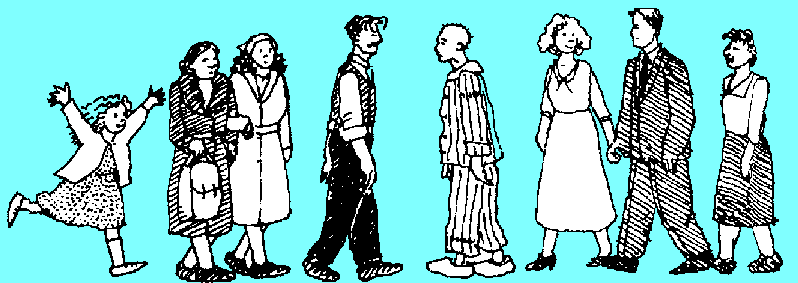 |
Anna Baum
The Transport
From "A New Beginning and Other Stories"
 |
Copyright by Anna Baum
| On a bright
but cool afternoon the door bell rang. My neighbour and good friend brought
me a book she had just finished reading. It was a well written personal
account of the author's life in a small town ghetto in Poland during the
war. "I will put on the kettle and we will have some tea. Do sit down,
please." We started to discuss this type of book, and, consequently,
life in the Lódz ghetto. I mentioned that recently people were talking
more often about their gruesome experiences. And then I asked: "You
were in the Lódz ghetto for quite some time, but you've never said
anything about it, as if it never existed." She didn't answer immediately,
but after a while she said: "Because it isn't easy. It is hard to give
an exact account of what happened then. I don't remember the dates any more.
Some things got tangled up. The most important ones are too painful. And
if one holds back that which hurts the most, what is left then?" She
spoke quietly but clearly, slowly sipping her tea; not caring for a biscuit,
and not even looking at me. She just sat there and gazed out the window.
It was mid-autumn. The maple leaves in the garden, lit by the pale sun, seemed filled with pure gold. I doubt if she noticed. And then, still looking out the window, she said: "My life in the ghetto wasn't any different from anybody else's. I went through the same hunger and misery. I feared for my child. What didn't I do to protect my Pereleh. In the ghetto I lost my husband. Buried my father. Took the body to the cemetery and with my own hands..." she sighed wearily. "Lost both brothers and my brother-in-law. Shall I tell you any particulars? For example, how I ran to my youngest brother to warn him of the 'Action,' only to find out that the SS-men got there before me, and that David, my last remaining brother, the baby of the family, was also gone. Gone forever. He left behind his young and pretty wife Luba, and their baby. No, I don't think that you want to know any details. Everyone had his share. Many talk about their misfortunes constantly, not able to restrain themselves. Some write about it. I'm glad they do. I can't. Only the transport stands out distinctly in my memories. And though I try my best, I can't forget it. I socialise with other people, desperately try to live what people call a 'normal' life, but, no, nothing helps much. I can't forget that transport." She fell silent, but after a lengthy pause she started again, on her own. "The transport was from the Lódz ghetto. To say that we were exhausted doesn't mean anything. We were at the very end of human endurance. Many had already died and the bodies were piled up in the far corner of the cattle car. We were suffocating. No air. No water. Everyone was pushing. 'Where to and what for?' I wondered. Perhaps for a breath of air. Mother was leaning against my back. I was holding Pereleh. Her head rested on my shoulder. The sweat. The stench, the cramps in the swollen legs. Near me Luba was holding her baby as if in a cradle.. Suddenly we felt that the train was slowing down. It became quiet. We held our breath. And then the train came to a halt. Someone unbolted the door from the outside. Air! Air!. And all at once the uproar. 'Raus! Raus! Schnell! Schnell! Laufschritten! Verfluchte Hund' The kicks, the lashing, the whipping. And above all the viciously trained dogs. Pereleh whimpered. We must have been quite strong. Otherwise, how would we have been able to form a column and march? Was it hope? The last hope? And then the gate. 'Arbeit macht Frei.' We came to a muddy square and formed a single line, the dogs with us all the time. Everywhere I dragged Mother along. I was afraid that the dogs may get at her. She was in front of me now. Left, right, very fast. Luba was already on the left, happy that they didn't take away her baby. We never knew which line was best. Mother stretched out her bony arms for Pereleh. "`Let her be,' I said. My arms were stiff. Mother was persistent. 'Let her be,' I repeated in anger. But Pereleh suddenly turned to Bubby and stretched out her arms. She wanted to be carried by her. She was still whining. She probably was hungry, tired. "`Alone you may still have a chance,' Mother whispered. She was pushed to the left. Holding the child, she tried to run, her legs swollen. With my blonde, blue-eyed Pereleh, she joined Luba with her baby. "I was driven to the right. And here I am. Why?" After so many years it was still a cry of the heart. Although she remarried after some years, she never had any more children. |